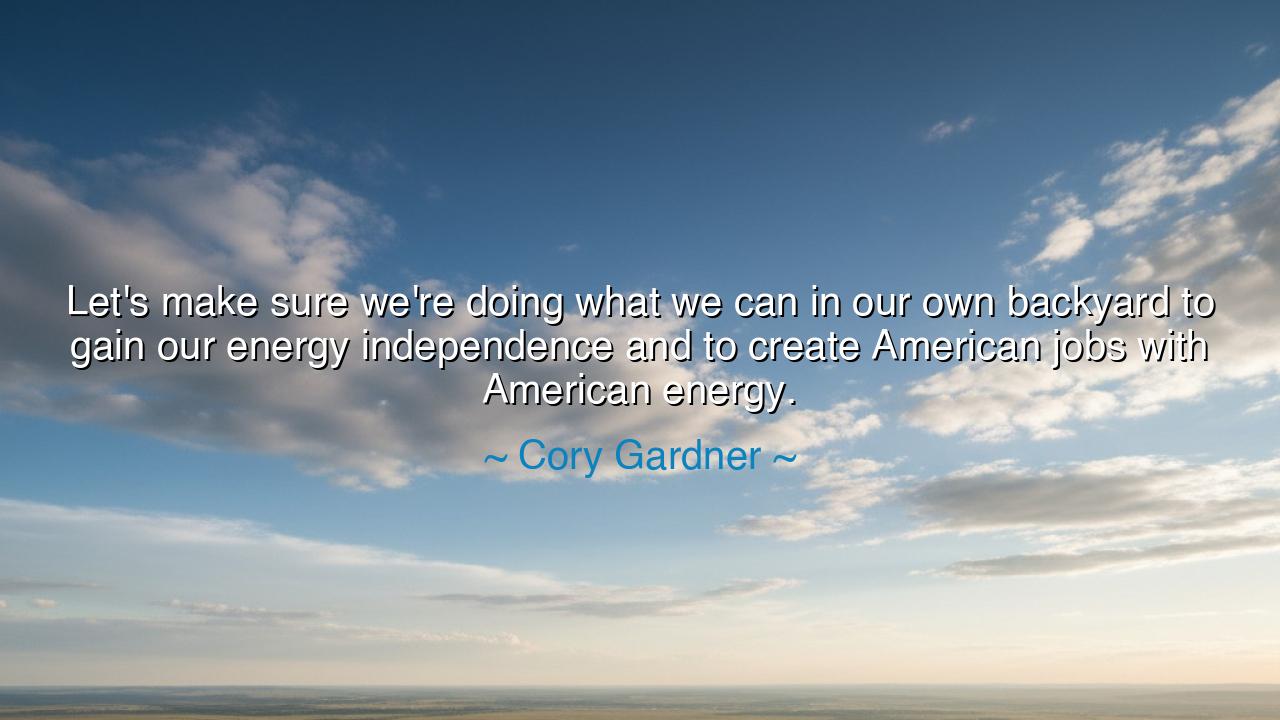
Let's make sure we're doing what we can in our own backyard to
Let's make sure we're doing what we can in our own backyard to gain our energy independence and to create American jobs with American energy.






“Let’s make sure we’re doing what we can in our own backyard to gain our energy independence and to create American jobs with American energy.” Thus spoke Cory Gardner, a voice of a restless generation seeking strength not from distant lands but from the soil beneath its own feet. His words rise from a time of uncertainty, when nations were bound not by friendship but by dependency — chained by oil, by trade, by the fragile bonds of global supply. Yet beneath his call lies an older truth, one known to the ancients: that a people who cannot sustain themselves are a people who live at the mercy of others. Independence, whether of nations or of souls, is not granted — it is built, cultivated, and guarded through labor and wisdom.
In the heart of Gardner’s words lies the spirit of self-reliance, a principle that has guided civilizations from their birth. The farmer who tills his land, the craftsman who shapes his tools, the builder who raises his home — all embody this same sacred law: strength comes from within. To depend too much on the bounty of others is to grow soft, to lose the power to stand firm when storms come. Energy independence, then, is not merely a policy or an economic goal; it is a symbol of sovereignty. It means that a nation draws its life from its own resources, its own ingenuity, and its own people — that its fire, both literal and spiritual, burns from within its own hearth.
History itself has shown what happens when this truth is forgotten. In the early twentieth century, mighty nations rose upon borrowed energy — coal from others, oil from strangers, metals from distant colonies. When conflict came, they found themselves weak and unprepared, their factories silent, their ships powerless. But those who tended their own backyard, who learned to use what the earth gave them, endured. Consider Japan after World War II — a nation shattered by war, poor in natural resources, yet rich in discipline and vision. By investing in technology, efficiency, and the will of its people, it rebuilt itself into a power that stood not by wealth alone, but by self-sufficiency of spirit. It is this same fire that Gardner calls his countrymen to rekindle.
To create American jobs with American energy is not only to build wealth but to forge dignity. For work is more than survival — it is the art of participation in the destiny of one’s people. The man who labors in his own land contributes not only to his home but to the strength of the nation. Every windmill erected, every solar field spread across the plains, every barrel of oil drawn from beneath American soil is an act of sovereignty, a declaration that “we shall provide for ourselves.” Gardner’s call, though practical in its sound, is moral in its essence — a plea for unity through labor, for pride through productivity, for freedom through effort.
The backyard he speaks of is both literal and symbolic. It is the field, the town, the community, the very space where people gather to shape their future. But it is also the inner realm — the soul of a nation that must look inward before it looks outward. Too long have nations looked to others to solve their needs, trading independence for convenience, and sovereignty for ease. Gardner’s words remind us that greatness is not imported. It is cultivated, like grain from the earth, through sweat, struggle, and vision. The ancients would have said: “Tend your garden well, for it is the mirror of your soul.”
Yet independence does not mean isolation. The wise understand that self-reliance is not the rejection of cooperation but the refusal of dependence. When a people stand strong on their own foundation, they can meet others as equals, not as beggars. They can trade fairly, ally honorably, and act freely. Energy independence, therefore, is not a wall but a foundation — the ground upon which true partnership is built. The nation that depends wholly on others cannot give, only take; but the nation that sustains itself can share, can lead, can inspire.
So let this teaching be carried forward to all generations: do not neglect your own backyard, whether it be your home, your community, or your nation. Build with your own hands. Learn from the land you walk upon. Let your energy — be it the fire of industry or the flame of purpose — be your own. For every person, every people, who learns to sustain themselves becomes a light in a darkened world, a testament to the ancient law of self-reliance.
And thus the lesson endures: independence, whether of a household or a nation, is not merely having what one needs — it is knowing that one can provide it. Let your labor be proud, your roots deep, and your fire eternal. For those who draw strength from their own ground shall never be at the mercy of another’s shadow.






AAdministratorAdministrator
Welcome, honored guests. Please leave a comment, we will respond soon